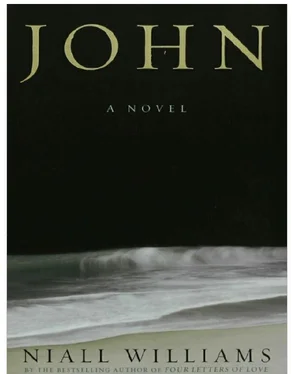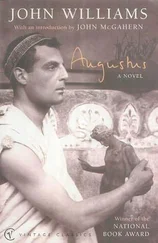They go an unfamiliar route, Auster to the fore, Papias some short distance behind as if he follows not. The journey is not long, but the heat oppressive. At an august building with round doors carved in a single large O, Auster awaits his charge. He smiles to see him come.
'Blessings to you, friend. You will see.' His eyes glitter like nothing in nature. 'Come.'
He opens the door on to air thickly fragranced. In an antechamber Papias waits. He should not have come, he thinks. He should have driven him off as an evil spirit. Should have been deaf to any words the other used. Papias paces this thought until it finds a contrary: he was among us. He was one of us, and for so long believed as us. So, too, may not he believe again? And Matthias, too. May it not be this chance is come for Papias to return them all to the fold? Is this not the mystery of the Lord, how all things fit and find place?
'Now. Come, come and cleanse here,' Auster says.
He leads the way to a font and folded cloths.
'Friend, shall I wash your feet?' he asks, smiles at the refusal.
After, Papias is brought along a hallway where a figure stands with silver bell. He is none the disciple knows, a newer follower.
'I leave you, friend. You will thank me, you will see,' Auster tells softly and retreats.
The bell peals, a bright tingling. The door is opened from within. Papias goes into a broad room unfurnished but for a great standing silver O similar to that he saw in the house of Diotrophes. There is a like couch on a raised platform, a pair of tall urns, long-stemmed white blossoms. There is the scent of frankincense. For some instants Papias is in the room alone. Who opened the door left by it as he entered. It is theatre of high order, the space prepared and allowed its play before the protagonist. Reverence, awe, respect: such are the prizes sought. The great circle of silver is ornately crafted, a masterwork without seam. From where Papias stands, he looks through it to the staged couch, the altar where now Matthias arrives. He wears a robe of palest blue and comes with hands flatly before him, palm-to-palm, as if he bears in miniature a church of one. He steps up, turns, looks down at the disciple through the O. Again an instant, then he looks above him and opens his hands to cup shape, to catch what invisibly falls. This he gathers until filled, and then opens both hands in a gentle gesture of throwing outwards and sharing the bounty he has just received. Matthias bows in after-thanks, opens wide his arms.
'Papias, welcome. May Divine God be with you.'
The disciple has lost his words.
Matthias comes down the side of the altar, his bare feet soundless. He stands before the visitor, surveys him. 'My heart is warmed. I am glad you have come,' he says.
'I did not want to come.'
'Nonetheless I am glad. Come and sit.' Matthias gestures a hand to his right. All in his manner is practised, the movement of hand in air a soft curve, as though it flows or mimes the supposed ease of angels.
Papias does not move. 'I will not sit.'
'Just so. You are afraid.' Matthias nods. 'You need not be afraid of me, Papias. I am a holy man. I will bring you no harm, only blessing. I am a man of God. As are you. Should we not sit and discuss?'
'I will not sit.'
'Ah. Do you wish to drink? Are you thirsty? You appear hot.'
'I want nothing. Tell me what you want to tell me,' Papias says shortly. He is hot and thirsty, his ear stump pulses painfully.
'So many things, my friend, so many things.' Matthias takes a step closer. His eye has never recovered, the lid only closes partly over it. There is an out-turned weal of pinkish white. His breath is near enough to smell, a sweet wine.
'We have lived the same life, you and I, Papias. Have we not?' he asks. 'Both of us seeking to find the truth. To find the Divine. Both of us servants of this quest. And is this not the best of a man? Is this not the highest ambition of a soul? To know that this life is but a shell of another eternal one, and that it is to be spent in the service of the Creator; is this not what you and I have understood?' He pauses. Papias does not answer him. 'We have both known this, and have both been seekers. We have both sought to serve, to have our earthly lives mean something to the Divine, to the One, to God, whatever name we have called him. It matters not. He is the same. And you and I, Papias, in our seeking both came to the same place. Both of us heard the preaching of a great preacher, an old man who might have been our father, who might have been the fathers we had each lost, and who spoke to us of a heavenly father and his son. A father who loved his son.'
Matthias's mouth is at Papias ear, his black beard touching; his voice he drops to a whisper. 'It's true. You know it. You know it for I know it. We are alike. We came to him for this reason and surrendered all else. We lived on Patmos, you and I both, and forgot the world. What did it matter to us? We did not care for this world, we cared for the love of the Father. We thought to have found what we sought. What hardships were on the island mattered not. We could live so for ever — until called to the next life.'
Matthias steps back, as if to consider where he has climbed, how far to above, how far to below.
'Dear Papias, good Papias, we have been alike, you and I, seekers of the truth, servants of the Creator. "O God, my soul thirsteth for thee, my flesh longeth for thee in a dry and thirsty land, where no water is." Have we both not prayed so? And has the Almighty not heard us? He has, Papias. The Almighty, the Divine, the One has heard. And answered me.' Matthias is close enough to kiss. 'And you also,' he whispers. 'You have been heard — and answered, Papias. Answered. I know. You have been chosen. You, of all, chosen, to be my right hand. Neither of us can deny it. You were dead. You were cold as dust. I asked for the Divine to intervene that you might be saved, that you might live to bear witness. And you were saved. Think on this. Think. Why do you live now when you were dead? Why do you live, Papias?'
'I live to praise God.'
'Indeed.'
'I live to follow the apostle John, the disciple of Jesus Christ, the Son of God.'
Matthias opens his hands as if to catch and crush the creed that comes at him. He might give a short response but thinks better of it and slowly brings his palms together before him. He looks at Papias with pity. His lips are tightly pressed.
'Good Papias,' he says at last. 'Good Papias, loyal and true Papias, my heart is full of love for you. You know this. I bear you the love of the Creator who has chosen you. And what I must tell I know will hurt, and I would not hurt the one I love. But,' Matthias sighs, opens his hands in a gesture of helplessness, 'from blindness to seeing is not easy passage. Many prefer the dark. But not a seeker such as you. You, good Papias, wish the light, wish the truth.' Matthias indicates a couch by the wall. 'Sit to hear.'
'I will stand. Tell what you tell and I will be gone for ever.'
'You see? You stay when already you could be gone. You seek the truth; this consoles me in the pain I must deliver. Papias, you have been blind. I, too, have been blind, I confess it. We mistook a messenger for the Messiah. It is not our fault, we had the conviction of an old man who said he was himself a witness, who said he himself had touched the hand of this Messiah and walked with him, who himself had seen miracles. O vanity and iniquity! Wickedness and conceit! I must tell you, Papias: this John you follow is not the same that followed Jesus of Nazareth. He pretends it only. Perhaps in his dotage he believes it having pretended so long.'
'It is not true! I will not listen!' Papias says, and turns towards the door.
'It is outrage, yes. It is painful, yes. But it is true, yes. I can show you the proof.'
Читать дальше










